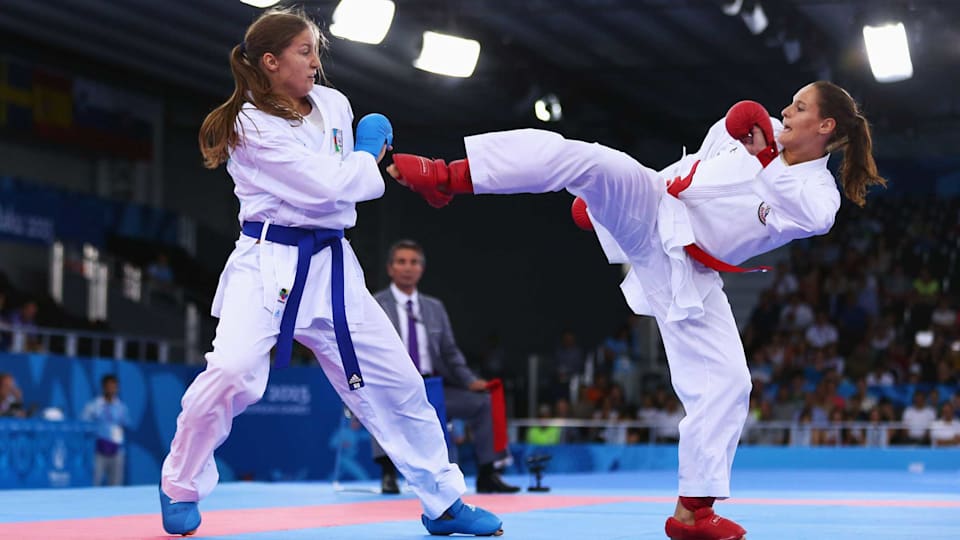Mind and body alliance is key for karate gold
Karate is one of five new sports set to debut at the Olympic Games Tokyo 2020. Here, Davide Benetello, Italy’s 1994 +80kg world champion and three-time European champion in kumite, karate’s one-on-one full contact discipline, explains what it is that all truly great karateka have in common.

“To become a champion, you have to have a martial spirit,” says Benetello. “Because you have to fight against yourself and you have to always follow the right way. This is the difference between a good athlete and a champion.”
It is this, according to the Italian, which connects the wildly exuberant Rafael Aghayev, Azerbaijan’s five-time world and 10-time European kumite champion, to his taciturn and focused rival in the -75kg category, Ukraine’s Stanislav Horuna. He sees the same “martial spirit” in Egypt’s 2016 world champion Giana Farouk as she sets an example for so many, and in Italy’s Sara Cardin, the reigning -55kg European gold medallist.
These athletes represent an extraordinary range of personalities and cultures but all embody ferocious athleticism, dexterity and precision. This alliance between mind and body starts at the very beginning and influences the most pressing decision that all aspiring karate athletes face.
“At the beginning, the sensei will teach the basics of karate through kata (the demonstrative discipline) and what we call kihon, the traditional techniques,” Benetello explained. “But to become a top athlete you have to choose if you are going to become kata or kumite. It is a feeling, and when an athlete is ready he or she will go to the sensei and say ‘I like kata’ or ‘[I like] kumite’ – it is always the athlete who decides, never the teacher.”
Karate is coming home
Despite his best efforts to make it happen at an earlier Games, Benetello believes the location for karate’s Olympic bow could not be more fitting.
“It is perfect. Tokyo is our home, our house,” said the Italian, who is Chairman of the World Karate Federation’s (WKF) Athletes’ Commission and has been involved in karate’s bid for Olympic inclusion since 2009.
“The Budokan [the arena in which the Tokyo 2020 karate competition will be held] is the place where we had our first world championships [in 1970]. It is a place where you can feel the spirit of martial arts.”
Benetello is among many who attribute huge credit for the sport finally achieving its Olympic aims to the WKF President, Antonio Espinós. Under the Spaniard’s watch, karate has continually adapted its rules to reduce injury, improve athlete safety and increase judging transparency. Benetello believes such measures have made the sport significantly more attractive to watch and participate in.
The numbers back the Italian up. From Central to Eastern Europe, Latin America to the Middle East, champions are emerging from all over the globe. Athletes representing 102 national federations competed at the 2016 WKF World Karate Championships, while at the 2017 WKF Youth Cup, held in Umag, Croatia, athletes from India, Turkey and Israel were among those to claim titles.
The foundation of the WKF’s Karate1-Premier League was also a significant moment for the sport. Launched in 2011, this year it features four tournaments, in Paris (France), Rotterdam (Netherlands), Dubai (UAE) and Rabat (Morocco), and will culminate in a championship held in Halle and Leipzig (Germany).
Despite having only 80 athlete places for both genders in Tokyo in three years’ time – 20 in kata and 60 across the kumite weight categories – Benetello expects “at least 35 to 40 NOCs [National Olympic Committees]” to be represented.
The Olympic factor
While Japan, Spain, Italy and Germany are all traditionally strong in both disciplines, with the likes of Ukraine excelling in kumite only, Benetello expects the Olympic factor to make a big and swift impact.
“In the next two years, in the Olympic qualification period, we will see a lot of nations getting stronger,” said the 44-year-old. “They will get much better support from their NOCs because in the past it was very difficult for some national associations [NAs] to get support, but now every NA will get support for what they need in order to succeed.”
Benetello has spent his career dreaming of his sport being included in the Olympic Games, but he is already focused on the future beyond Tokyo.
This is our beginning. We are very optimistic, because karate deserves its place in the Olympics for sure Davide Benetello - Davide Benetello
“This is our beginning. We are very optimistic, because karate deserves its place in the Olympics for sure,” he said. “They [fans and officials] will see very clear technique, very fast technique, precise actions, and a big demonstration of respect and of how we follow the martial spirit.
“For sure we hope to have many more places in future Olympics.”
